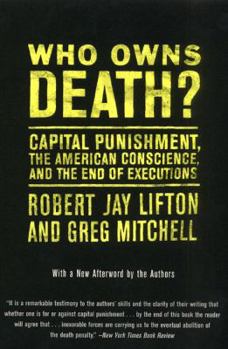Who Owns Death?: Capital Punishment, the American Conscience, and the End of Executions
Select Format
Select Condition 
Book Overview
In this timely book, Robert Jay Lifton and Greg Mitchell investigate the mindsets of individuals involved in the death penalty -- including prison wardens, prosecutors, jurors, religious figures, governors, judges, and relatives of murder victims -- and offer a textured look at a system that perpetuates the longstanding American habit of violence. Richly rewarding and meticulously researched, Who Owns Death? explores the history of the death penalty...
Format:Paperback
Language:English
ISBN:038079246X
ISBN13:9780380792467
Release Date:January 2002
Publisher:Harper Perennial
Length:304 Pages
Weight:0.50 lbs.
Dimensions:0.8" x 5.3" x 8.0"
Customer Reviews
4 ratings
Good book -- good angles on capitol punishment
Published by Thriftbooks.com User , 21 years ago
I found this book a good read and would recommend it. One major objective of this book is to show capitol punishment from all angles. They talk about he prosecutors, the jurors, the judge, the executioners, the governors, and all other cogs in the system. By the time they are done, they make a convincing argument that this process is so fractionalized that nobody feels ultimate responsibility for this grave action (which helps keep it alive). It also explores people's "support" for capitol punishment. You come to realize that the *objective* of a lot of supporters is keeping the criminal off the street, not vengeance. Thus, when given the option of life without parole, the support for capitol punishment drops below 50%. I feel that there was a lot of "On one hand... then on the other hand... but you have to remember... and it is important not to discount...". Although they referenced many polls and facts, I would have preferred this to be a little more 'scientific' and less philosophical. Also in their effort to explor all sides of this issue, many of their statements are pretty obvious -- for example, victim families what vengence and 'closure'. Duh. I found the style to be a little odd. One of the writers is a journalist and the book is written accordingly. One one hand, they try to be even-handed showing all sides, while on the other, they write with the base assumption that capitol punishment is wrong. I did not find this confusing, but it was a little odd. I don't wish these comments to discourage people -- it is a worthwhile read, but it does have a few shortcommings.
Very good book!
Published by Thriftbooks.com User , 21 years ago
I read this book for a class and I really liked the book! I thought it was one of the best books that I've read on the issue of capital punishment.
BLOWS THE LID OFF CAPITAL PUNISHMENT
Published by Thriftbooks.com User , 22 years ago
Lifton and Mitchell do a great job of not only explaining the vast problems with capital punishment - from its bias against blacks to its immorality - but they also delve into the psyche of everyone involved. Whether you are pro-death penalty or a strong opponent, this book opens your eyes to everything that is wrong with capital punishment.But, you also learn why you either favor or object to the practice though detailed psychiatric analysis that most people don't even consider when weighing in on the issue.Sure, the authors are fierce death penatly opponents, but that does not stop them from putting a critical eye on both sides of the debate and providing strong arguments for the end of this process.
Capital Punishment: America's Dilemma
Published by Thriftbooks.com User , 23 years ago
The book does a great job in providing an overview of the death penalty and why it should be discontinued. The authors use an anecdote style and good documentation to debunct the death penalty on moral, religious, and pragmatic reasons. Nearly everyone has heard the DNA argument and the lack of competant legal representation for death row prisoners as a reason for discontinuing capital punishment. Lifton and Mitchell present original ideas such as "death dynamism" which promotes a cycle of death(i.e. domestic terrorism martyrs), how the death penalty actually prevents emotional healing, and that who dies can depend on locale and a particular judge. The authors present somber examples throughout the book, one in particular about how one judge may agonize over the penalty and another may draw a "happy face" on a death warrant. A minor point; I wish that the authors had explored the character of American violence more deeply particularly the current culture which is currently evolving via graphic video games, music, and of course movies. I say this not from a moral basis but in a pragmatic sense that these influences may make society less sensitive to the loss of human life. I highly recommend this book and feel it will be a excellent resource for years to come.




